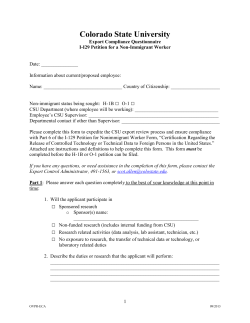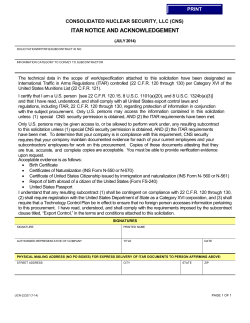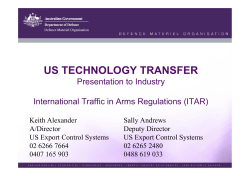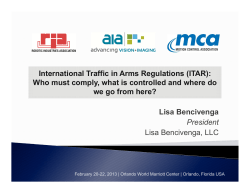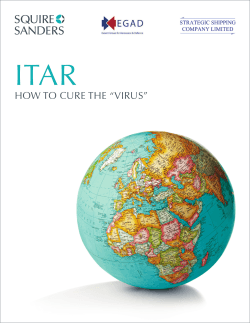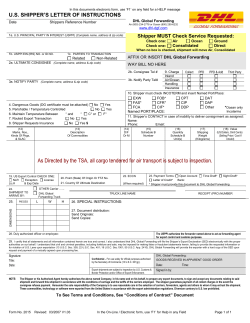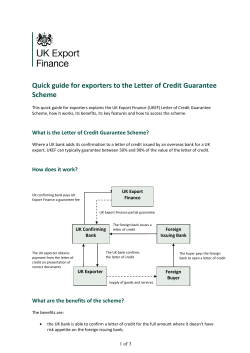
Document 53001
Telephone: (808) 956-7241 Fax: (808) 956-5022 Email: nsakamoto@rcuh.com The Research Corporation of the University of Hawaii Human Resources Department December 29, 2011 MEMORANDUM TO: All Principal Investigators FROM: SUBJECT: Nelson Sakamoto RCUH Director of Human Resources ITAR/EAR Guidelines for H-1B and O-1 Visa Compliance (REVISED) Effective February 20, 2011, the United States Citizenship and Immigration Services (USCIS) requires employers to use the revised Form I-129, Petition for a Nonimmigrant Worker, when petitioning for H-1B or O-1 nonimmigrant visas. The primary change made to the revised Form I-129 is the addition of Part 6: Certification Regarding the Release of Controlled Technology or Technical Data to Foreign Persons in the U.S. This change requires the Research Corporation of the University of Hawaii (RCUH) to certify whether a nonimmigrant worker will be performing work that is subject to the U.S. Department of State’s International Traffic in Arms Regulations (ITAR) or the U.S. Department of Commerce’s Export Administration Regulations (EAR) and if an export license will be required. WHAT IS AN ITAR/EAR EXPORT?: Both ITAR and EAR are federal laws that prohibit the “export” of controlled technology and technical data to foreign countries and citizens of these countries identified in these regulations. U.S. employers may export these technologies provided they meet the requirements specified in the ITAR and EAR regulations (e.g., obtain an applicable license to export). An export is not limited to shipping goods/services to a foreign country; it also includes the release of controlled technology or technical data to a foreign national working in the U.S. ITAR and EAR regulations have very strict rules against disclosure (including oral or visual disclosure) or transferring controlled technology or technical data to a foreign person working in the U.S. To comply with the ITAR and EAR regulations, the RCUH must accurately complete the new I-129 form. Therefore, Principal Investigators must understand the ITAR/EAR regulations as it applies to your own research project(s). Principal Investigators must be able to determine whether any of the technology or technical data that they work with is governed by the ITAR and/or EAR. If so, the Principal Investigator must decide whether any of the technology or technical data needs to be released to, or be accessed by, the foreign national employee. Finally, Principal Investigators must determine whether an export license is required from the Department of Commerce Bureau of Industry & Security or the Department of State Directorate of Defense Trade Controls prior to releasing such technology or technical data to the foreign national employee. (For more information about ITAR/EAR regulations, please refer to the UH E5.218 Compliance with Export Controls Laws and Regulations policy at http://www.hawaii.edu/svpa/ep/e5/e5218.pdf.) The UH Export Compliance Officer is available to assist in making these determinations. The contact information for the UH Export Compliance Officer is located at the end of this Memorandum. 2530 Dole Street, Sakamaki Hall D-‐100 • Honolulu, Hawaii 96822 ♦ An Equal Opportunity Employer ITAR/EAR Guidelines for H1-B and O-1 Visa Compliance February 22, 2011 Page 2 NEW RCUH COMPLIANCE FORM (Initial Certification and Follow-up Certification): To comply with the new requirements of the revised Form I-129, we have instituted a new “RCUH H1-B/O-1 Export Compliance Certification” form (RCUH Form I-100) that must be completed and submitted along with the H-1B/O-1 Request Form(s). On the RCUH H-1B/O-1 Export Compliance Certification form, you are required to acknowledge that you have reviewed and understand, and have/will continue to comply with the U.S. Munitions List [identified in the Arms Export Control Act (22 U.S.C. 2778)] and the Commerce Control List [identified in the Export Administration Act (50 U.S.C. 2401)]. Furthermore, you will certify that if your foreign national employee’s work assignments or work environment change to where exposure to ITAR/EAR regulated technologies may become present, a new certification form will be submitted to the RCUH Human Resources Department immediately. PENALTIES (FINES/IMPRISONMENT): Falsification of the “RCUH H1-B/O-1 Export Compliance Certification” form (RCUH Form I-100) may lead to immediate termination of your employee’s employment/visa status and all support provided to you and your program by the RCUH. The importance of providing correct attestations with respect to the export control requirements are underscored by the penalties for providing incorrect information. The Form I129 requires the employer to certify under penalty of perjury under the laws of the U.S. that the petition and the supplemental evidence are honest and accurate to the best of the employer’s (and Principal Investigator’s) knowledge. Violations of the ITAR/EAR regulations may result in, but not limited to, the following penalties: • International Traffic in Arms Regulations (ITAR) Ø Criminal Sanctions: o Employer fines of up to $1,000,000 for each violation o Individual fines of up to $250,000 or imprisonment for up to ten years, or both, for each violation. Ø Civil (Administrative) Sanctions: Fines of up to $12,000 for each violation, except that the fine for violations involving items controlled for national security reasons is up to $120,000 for each violation. Ø Other Sanctions: Denial of export privileges and/or Seizure/Forfeiture of goods. • Export Administration Regulations (EAR) Ø Criminal Sanctions: o Employer fines of up to the greater of $1,000,000 or five times the value of the exports for each violation o Individual fines of up to $1,000,000 or up to ten years in prison, or both, for each violation. Ø Civil (Administrative) Sanctions: Fines of up to $500,000 for each violation. Ø Other Sanctions: Denial of export privileges, exclusion from practice, and/or Seizure/Forfeiture of goods. QUESTIONS?: Questions relating to ITAR and/or EAR compliance should be directed to Leonard R. Gouveia Jr., the University of Hawaii Administrative and Export Compliance Officer, Office of the Vice President for Research, at (808) 956-4740, or lgouveia@hawaii.edu. 2530 Dole Street, Sakamaki Hall D-‐100 • Honolulu, Hawaii 96822 ♦ An Equal Opportunity Employer
© Copyright 2025
